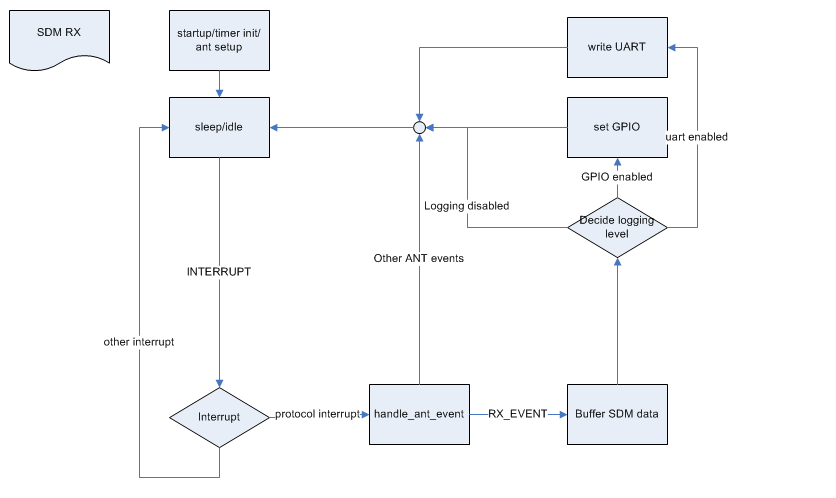 |
nRF51 SDK
|
 |
nRF51 SDK
|
The Stride and Distance Monitor minimal example RX (Slave). More...
Macros | |
| #define | CHANNEL_0 0x00 |
| #define | CHANNEL_0_RX_CHANNEL_PERIOD 8134u |
| #define | CHANNEL_0_ANT_EXT_ASSIGN 0x00 |
| #define | CHANNEL_0_FREQUENCY 57u |
| #define | NETWORK_0 0x00 |
| #define | NETWORK_0_KEY {0, 0, 0, 0, 0, 0, 0, 0} |
| #define | CHANNEL_0_CHAN_ID_DEV_TYPE 0x7Cu |
| #define | CHANNEL_0_CHAN_ID_DEV_NUM 0x00 |
| #define | CHANNEL_0_CHAN_ID_TRANS_TYPE 0x00 |
| #define | ANT_EVENT_MSG_BUFFER_MIN_SIZE 32u |
| #define | BROADCAST_DATA_BUFFER_SIZE 8u |
Functions | |
| void | PROTOCOL_EVENT_IRQHandler (void) |
| Function for Stack Interrupt handling. | |
| void | softdevice_assert_callback (uint32_t pc, uint16_t line_num, const uint8_t *p_file_name) |
| Function for handling softdevice asserts. More... | |
| void | app_error_handler (uint32_t error_code, uint32_t line_num, const uint8_t *p_file_name) |
| Function for handling an error. More... | |
| static void | ant_channel_sdm_rx_setup (void) |
| Function for setting up ANT module to be ready for SDM RX broadcast. More... | |
| void | sdm_main_loop (void) |
| Function for Stride and Distance Monitor RX example main loop. More... | |
| int | main (void) |
| Function for application main entry, does not return. More... | |
Variables | |
| static uint8_t | m_network_0_key [] = NETWORK_0_KEY |
The Stride and Distance Monitor (SDM) slave implements all of the features, which are required for the receiver to be compliant with the ANT+ SDM profile, as defined by the ANT+ SDM specification:
The process flow of the SDM RX example is illustrated below:

For logging UART will be the primary display. Data will be printed after broadcast data is received. Depending on the page received, the following data will be logged:
The logging with UART will be enabled by default in the project file. This can be deactivated by removing TRACE_UART from the compiler flags. When deactivated the data processing function will not be included in the compilation, as there are no need to interpret the data received, when we can not display the information.
As UART will use some extra current, a low power alternative is also available, using GPIO. By default the GPIO pins are connected to LEDs when using the PCA10003 ev-kit board or with nRF6310 with setup A. Also GPIO logging is enabled by default by the project file. This can be deactivated by removing TRACE_GPIO from the compiler flags. The GPIO pins to be used can be changed by editing the GPIO defines.
When GPIO logging is enabled the following GPIO will toggle:
When using PCA10003 board this board only have two leds. SDM_GPIO_2 will not be connected to any LED, but could be monitored by a logic analyzer or such.
| #define CHANNEL_0 0x00 |
ANT Channel 0.
| #define CHANNEL_0_RX_CHANNEL_PERIOD 8134u |
Channel period 4.03 Hz.
| #define CHANNEL_0_ANT_EXT_ASSIGN 0x00 |
ANT Ext Assign.
| #define CHANNEL_0_FREQUENCY 57u |
Channel Frequency.
| #define NETWORK_0 0x00 |
ANT Network 0.
| #define NETWORK_0_KEY {0, 0, 0, 0, 0, 0, 0, 0} |
Public ANT network.
| #define CHANNEL_0_CHAN_ID_DEV_TYPE 0x7Cu |
Device type 124.
| #define CHANNEL_0_CHAN_ID_DEV_NUM 0x00 |
Device number.
| #define CHANNEL_0_CHAN_ID_TRANS_TYPE 0x00 |
Transmission type.
| #define ANT_EVENT_MSG_BUFFER_MIN_SIZE 32u |
Minimum size of ANT event message buffer.
| #define BROADCAST_DATA_BUFFER_SIZE 8u |
Size of the broadcast data buffer.
| void softdevice_assert_callback | ( | uint32_t | pc, |
| uint16_t | line_num, | ||
| const uint8_t * | p_file_name | ||
| ) |
| [in] | pc | The value of the program counter. |
| [in] | line_num | Line number where the error occurred. |
| [in] | p_file_name | Pointer to the file name. |
| void app_error_handler | ( | uint32_t | error_code, |
| uint32_t | line_num, | ||
| const uint8_t * | p_file_name | ||
| ) |
Function for error handling, which is called when an error has occurred.
| [in] | error_code | Error code supplied to the handler. |
| [in] | line_num | Line number where the handler is called. |
| [in] | p_file_name | Pointer to the file name. |
|
static |
Issues the following commands:
| void sdm_main_loop | ( | void | ) |
The main loop will try to sleep as much as possible. Every time a protocol event occours, the application will be woken up, polling the ANT stack event queue. When finished processing all events, the application will go back to sleep.
| int main | ( | void | ) |
The main function will do all necessary initalization. This includes sdm rx module and softdevice.
|
static |
ANT network key for SDM example.